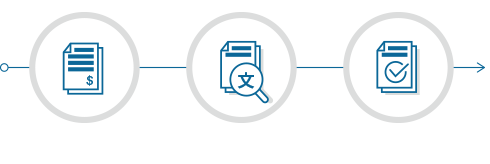What is eCOA?
eCOA (electronic Clinical Outcome Assessment) is a clinical trial methodology where patients directly input their symptoms and experiences via smart devices. It enhances accuracy and efficiency compared to traditional paper questionnaires.

What is Linguistic Validation?
Since eCOA questionnaires are used across diverse patient populations globally, linguistic validation is critical for proper comprehension. It is the process of ensuring the content is accurately translated and culturally adapted into the target languages. This allows eCOA to be properly conveyed to patients in different countries.
Linguistic validation is one of the most complex translation methods exclusively applied in life sciences translation. It requires not only translation expertise, but also an in-depth understanding of how patient-facing materials are used in specific patient conditions.
Where is Linguistic Validation Needed?
The key areas requiring linguistic validation include:
Clinical trial questionnaires and surveys that must accurately capture patient opinions and experiences. Cultural and linguistic appropriateness are vital.
Product documents like instructions for use, labels, and manuals for medical devices so patients and healthcare professionals can properly understand and use them. Culturally adapted translations are essential.
Academic documents including study result reports and papers transmitting medical information and research findings. These materials may be translated into various languages, requiring assured accuracy and cultural suitability.
Regulatory submissions prepared by pharmaceutical and medical device companies for health authorities. Related compliance documents should also undergo validation when translated into multiple languages.
In summary, linguistic validation plays a crucial role in most documentation and instruments used in healthcare and life sciences, impacting all aspects related to patient-reported outcomes and clinical research.
Linguistic Validation Process

The streamlined linguistic validation process per ISPOR guidelines consists of:
- Forward Translation: The first step is usually forward translation. Here, qualified translators translate the original content into the target language. They focus on accurately conveying the meaning of each item or question while considering cultural and linguistic differences.
- Reconciliation: In this step, experts compare the original content and forward translationsto create a harmonized version. This involves collaboration among translators, linguists, and content developers to resolve any discrepancies or inconsistencies.
- Back Translation: After the forward translation, a second qualified translator translates the document back into the source language. This back-translated version helps assess the accuracy of the initial translation.
- Harmonization: Harmonization involves reconciling multiple translations into a unified version. Experts compare the original content with the translations to identify discrepancies and ensure accuracy.
- Migration: Migration involves adapting translated content from one platform or format to another suitable for data collection or administration.
- Screenshot Review: This step focuses on the visual presentation and formatting of the translated content.
- Cognitive Debriefing: After harmonization, the translated content is tested with target language speakers through cognitive debriefing interviews. Participants provide feedback on clarity, relevance, and cultural appropriateness to improve the translation.
This produces translations that accurately reflect the content of the original version both linguistically and culturally.
Conclusion
In conclusion, linguistic validation is vital for upholding integrity in medical research by accurately capturing patient-reported outcomes across linguistic and cultural differences. By following rigorous validation protocols, healthcare and pharmaceutical industries can achieve accurate, culturally adapted translations to enhance research quality and reliability.
Hansem Global has a specialized team of biomedical translation experts in linguistic validation and eCOA management. Supported by a global network of translators, interviewers, documentation specialists, researchers, clinicians and in-country reviewers, we are well-equipped to handle linguistic validation projects with precision.
Contact Hansem Global for high-quality translation of your clinical trial and medical documentation.






